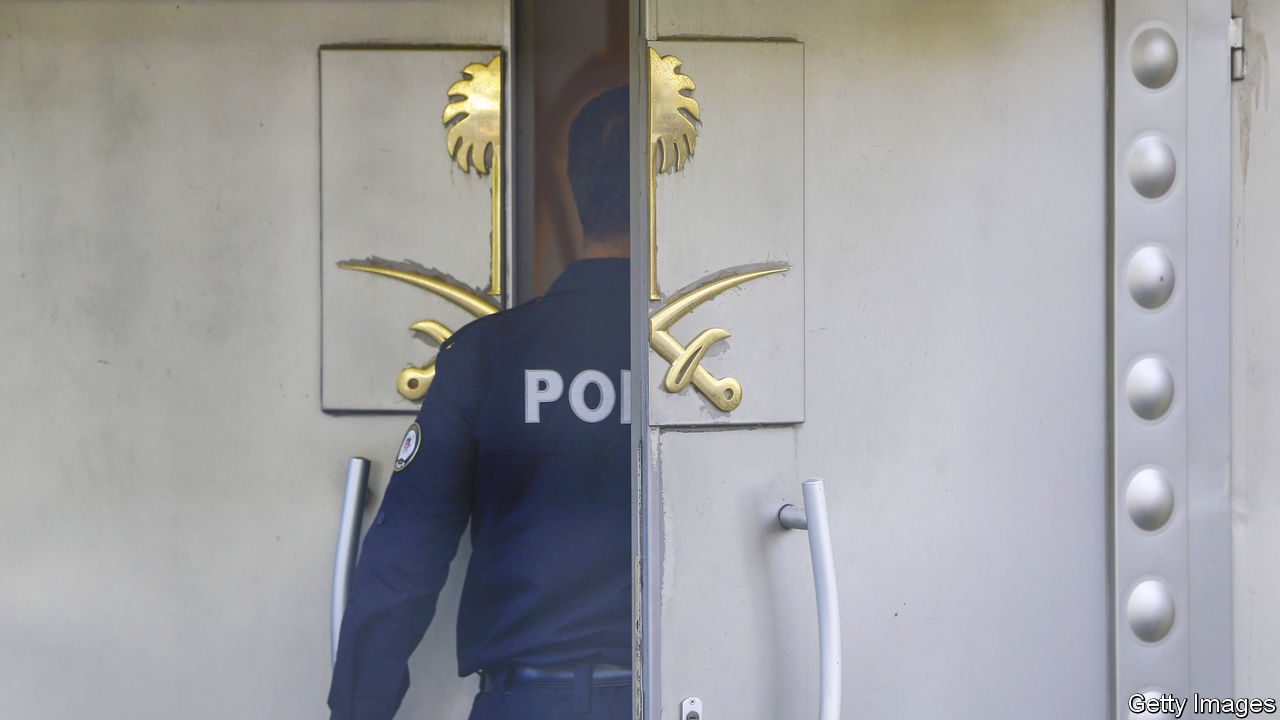
[ad_1]
WHEN Muhammad bin Salman, Saudi Arabia’s crown prince, said on October 24th that no one could drive a wedge between his kingdom and Turkey, speculation mounted that Turkey’s president, Recep Tayyip Erdogan, had agreed to shield him from any allegations of involvement in the murder of Jamal Khashoggi, a Saudi journalist. What ensued suggests otherwise. Days after the prince spoke, a number of news outlets reported that Turkish officials had played audio recordings of the journalist’s last moments to the director of the CIA, Gina Haspel. Shortly afterwards, Turkey demanded the extradition of the 18 men suspected of torturing and murdering Mr Khashoggi inside Saudi Arabia’s Istanbul consulate on October 2nd. In a statement issued on October 31st, the Turkish prosecutor in charge of the case said that Mr Khashoggi had been strangled as soon as he entered the consulate, and that his corpse was dismembered and destroyed. The Saudis would prefer to move on. Mr Erdogan seems to desire the opposite. Where does this end, and what is at stake?
The Saudis could not have handled the murder’s fallout any worse. Their officials have gone from claiming they knew nothing of Mr Khashoggi’s whereabouts, to saying he died during a brawl inside the consulate, to conceding that his murder may have been premeditated, albeit as part of a rogue operation of which senior members of the intelligence services were unaware. Turkey could not have handled things any better. The world’s leading jailer of journalists can claim credit for exposing a journalist’s murder, forcing a confession out of the Saudis, and avoiding direct confrontation with the kingdom’s rulers. On top of everything else, Turkey still appears to have an ace up its sleeve, in the form of recordings and documents that some have suggested could even implicate Prince Muhammad in the murder.
Citing the leaks by Turkish officials and Mr Erdogan’s reluctance to confirm details, analysts have suggested that Turkey’s leader wants to extract concessions from Saudi Arabia in exchange for allowing the crown prince to save face. These could include an injection of cash into Turkey’s sputtering economy, plus a private apology. (Turkey is, after all, outraged over the alleged use of a diplomatic mission as a torture chamber.) Instead, Mr Erdogan may be managing the fallout from the murder to rein in Prince Muhammad, or even block his path to the throne. His government has been at loggerheads with Saudi Arabia for almost a decade. The crown prince has made things even more difficult. Under his leadership, Saudi Arabia has threatened to attack Iran, imposed an embargo against Qatar, put out feelers to Kurdish insurgents in Syria, and continued to endorse a crackdown against the Muslim Brothers in Egypt, all actions that Turkey fiercely opposes. Wary of provoking the Saudis and their Gulf allies, who have invested billions of dollars in Turkey, Mr Erdogan’s government has so far tried to play down such differences. Prince Muhammad has not. Earlier this year, he allegedly referred to Turkey as part of a regional “triangle of evil”. “Erdogan does not want him as king,” says Behlul Ozkan, an academic at Istanbul’s Marmara University.
A broader ideological conflict is also at play. Mr Erdogan and the Saudis represent two rival visions of political Islam. His authoritarian instincts and the sorry state of Turkey’s democracy notwithstanding, Mr Erdogan owes his legitimacy to elections and public support. Prince Muhammad owes his to the Saudi bloodline and palace support. “The Turkish example scares MBS,” says Mr Ozkan, particularly in the wake of the Arab spring, when Islamist movements helped bring down authoritarian regimes in Tunisia, Libya and Egypt, and consolidated their gains through elections. “The Saudis and the Emiratis fear their populations might also want elections one day.” But Mr Erdogan does not want to overplay his hand. There is a chance that releasing evidence (if such evidence exists) connecting Prince Muhammad to Mr Khashoggi’s murder might force the ageing King Salman and the Americans to withdraw their support for the prince. But there is a much higher risk it will not. (Mr Trump has already suggested he would not allow a journalist’s death to get in the way of his government’s relations with Saudi Arabia.) Mr Erdogan will not try to dislodge the prince on his own, without American support. A young, unpredictable Saudi king bent on revenge against him is the last thing Turkey’s president needs.
Source link